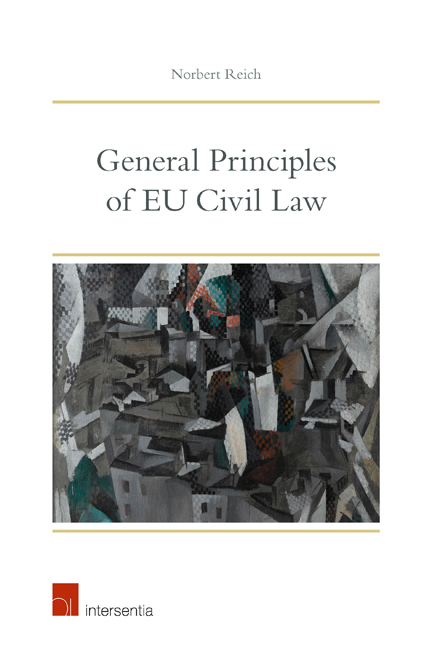Book contents
- Frontmatter
- Preface
- Contents
- Table of ECJ cases: alphabetical
- Table of ECJ cases: chronological
- Table of EU legislation
- List of abbreviations
- Introduction. What are General Principles of EU Civil Law?
- Chapter 1 The Principle of “Framed” Autonomy
- Chapter 2 The Principle of Protection of the Weaker Party
- Chapter 3 The Principle of Non-Discrimination
- Chapter 4 The Principle of Effectiveness
- Chapter 5 The Principle of Balancing
- Chapter 6 The Principle of Proportionality
- Chapter 7 An Emerging Principle of Good Faith and of a Prohibition of Abuse of Rights?
- Summary. Seven Theses and a Conclusion
- Index
Chapter 3 - The Principle of Non-Discrimination
Published online by Cambridge University Press: 22 November 2017
- Frontmatter
- Preface
- Contents
- Table of ECJ cases: alphabetical
- Table of ECJ cases: chronological
- Table of EU legislation
- List of abbreviations
- Introduction. What are General Principles of EU Civil Law?
- Chapter 1 The Principle of “Framed” Autonomy
- Chapter 2 The Principle of Protection of the Weaker Party
- Chapter 3 The Principle of Non-Discrimination
- Chapter 4 The Principle of Effectiveness
- Chapter 5 The Principle of Balancing
- Chapter 6 The Principle of Proportionality
- Chapter 7 An Emerging Principle of Good Faith and of a Prohibition of Abuse of Rights?
- Summary. Seven Theses and a Conclusion
- Index
Summary
“SPILL-OVER” EFFECTS OF NONDISCRIMINATION ON CIVIL LAW?
The concept of non-discrimination, also called “equal treatment”, plays an important role in Union law, and has in many cases decided by the Court of Justice of the EU been understood as a general constitutional principle. As regards the economic law of the Union, market subjects should be treated as equals if they are in a comparable situation, or conversely, law should not impose equal treatment on them if they are in different situations, unless such this difference is objectively justified. The Codorniú case provides us with an example. The Court invalidated a Community regulation forbidding Spanish producers from using the traditional term crémant by reserving it to French and Luxembourg producers of sparkling wine. The measure was held to violate the principle of non-discrimination because Spanish producers were without justification put on an unequal basis relative to other producers.
Over time EU non-discrimination law, apart from the distinctly market-orientated approach, has also taken on a social dimension by including within its ambit the struggle against discrimination based on gender, race, ethnic origin, age, disability or sexual orientation. This development is part of a more general trend in fundamental rights in the EU.
Article 21 on “non-discrimination” of the Charter of Fundamental Rights, which became formally part of EU law after the Lisbon Treaty was ratified, but which had guided the ECJ in its interpretation and application of Community law beforehand, reads:
“1. Any discrimination based on any ground such as sex, race, colour, ethnic or social origin, genetic features, language, religion or belief, political or any other opinion, membership of a national minority, property, birth, disability, age or sexual orientation shall be prohibited.
2. Within the scope of application of the Treaty […] and without prejudice to the special provisions […] any discrimination on grounds of nationality shall be prohibited.”
- Type
- Chapter
- Information
- General Principles of EU Civil Law , pp. 59 - 88Publisher: IntersentiaPrint publication year: 2013



